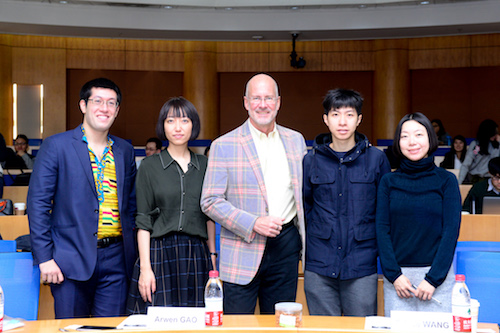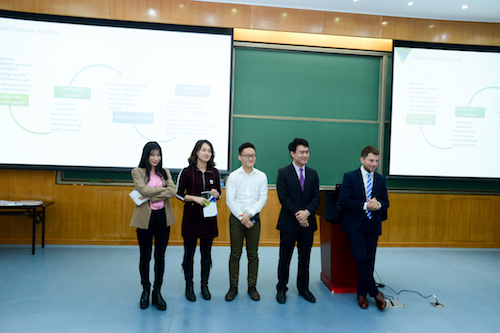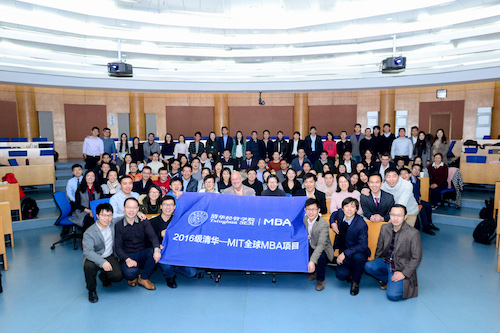Ben Binbin Wu,
GMBA Class of 2018
One core module
that Tsinghua GMBA-ers will remember with fondness is Managerial Thinking,
taught by Professor Steven White. The course focuses on how to solve problems with
a global mentality. The hands-on, practical course divides the class into small
teams, each tasked with solving a problem of broad impact and developing a
concept for a semester-ending pitch competition to a panel of experienced venture
capitalists and angel investors. Ben Wu from the Class of 2018 recaps his
experience and what he learned from the course.

Professor Steven White poses with local experts who
graciously served as judges at the Design for Extreme Impact pitch competition.
The main project for Managerial Thinking
required each study group to come up with a solution for a need faced by identified
focal users. To begin the process, each group sat together to brainstorm common
issues that we felt affected individuals located within the “bulk of the
pyramid.” Professor White emphasized the importance of looking beyond the surface-level
problems to the various components that make up a system and the ramifications
of those components. During our brainstorming, we recognized that many of our
group members had friends who were in the process of having a first child. From
there, we were able to distill down to our potential focal users – expecting
mothers and their families.
After we decided on the group we wanted to
address, we conducted actual face-to-face interviews with expecting mothers to
gather their insights. From our interviews, we were able to surmise that the
main problems facing those expecting in Beijing were the tedious examinations
they had to complete on a monthly basis. Sometimes the examination would only
be a 30-minute blood test, but the entire process would take the expectant
mothers three hours due to the uncertainty of traffic as well as the queue at
the hospital.
Summarizing all the interviews and refining
our challenge statement, we recognized the need to make the pregnancy process for
“the expecting mothers much more efficient to save time, money, and resources [both]
now and [in] the future.” With this challenge statement in mind, our group devised
two possible solutions to fulfill the needs of our focal users. Our first
potential solution was actually having designated “nurses” spread throughout
Beijing to conduct the examinations in the homes of the expecting mothers. The
nurses would then transport the test samples back to the hospitals for testing.
Our second solution was a “moving hospital,” where all the necessities of the hospitals
would be installed into a moving caravan to conduct the appropriate tests.
With our solutions, we conducted a second
round of interviews to see how our focal users would receive the potential
solutions. Our interviewees unanimously favored our first idea to have the
simple examinations like blood and urine testing performed at home, whereas the
complicated procedures like ultrasounds would still be conducted at the
hospitals. Gathering all the feedback and consulting within our group, our
final solution was a mobile application that allowed the expecting mothers to
book appointments at the hospitals as well as book a “mobile nurse” to conduct
the tests in the users’ homes. The app would also allow the expecting mother to
track the progress of the pregnancy as well as communicate with other expecting
mothers to gather more information.

Managerial Thinking teams pitch their ideas and engage in a challenging Q&A session with judges and audience
alike.
For the final step, we had the
opportunity to actually pitch our solution to distinguished venture capitalists
and receive valuable feedback. This final step was very helpful for me in my
future endeavors because it gave me additional insight into important
information VCs wanted to hear. It allowed our group to narrow our ideas into
the relevant points that would appeal to a venture capitalist and best position
us to receive the funding a project would need.
The entire project was a great learning opportunity
and, I believe, will be helpful for my future plans. I learned in a more
tangible way the importance of dealing with specifics and not focusing only on
the end product. The deeper I can dig into the mentality of my focal users, the
more significant the problems I can address to make the final product even more
relevant to the needs of those users. Our group treated this project like a
potential business venture; because of this, it was especially fulfilling to see
the brainstorming yield a final product. The project taught us how to think
more effectively, from gathering information to solving the needs of our focal
users. This mentality will be critical to maintain as we progress through our
careers.

The entire class poses with Professor Steven White to
memorialize the climax of an intense but rewarding semester together.